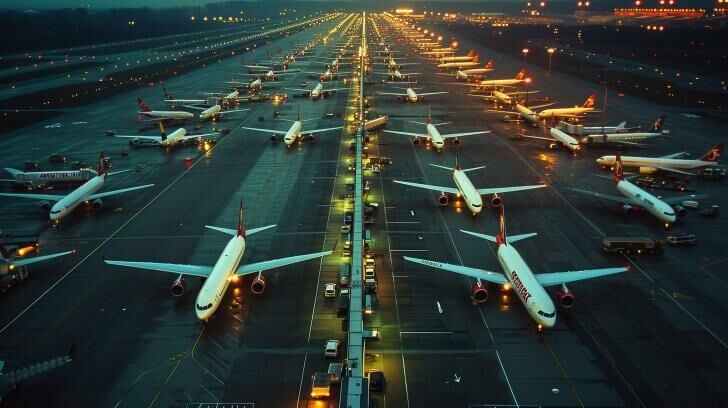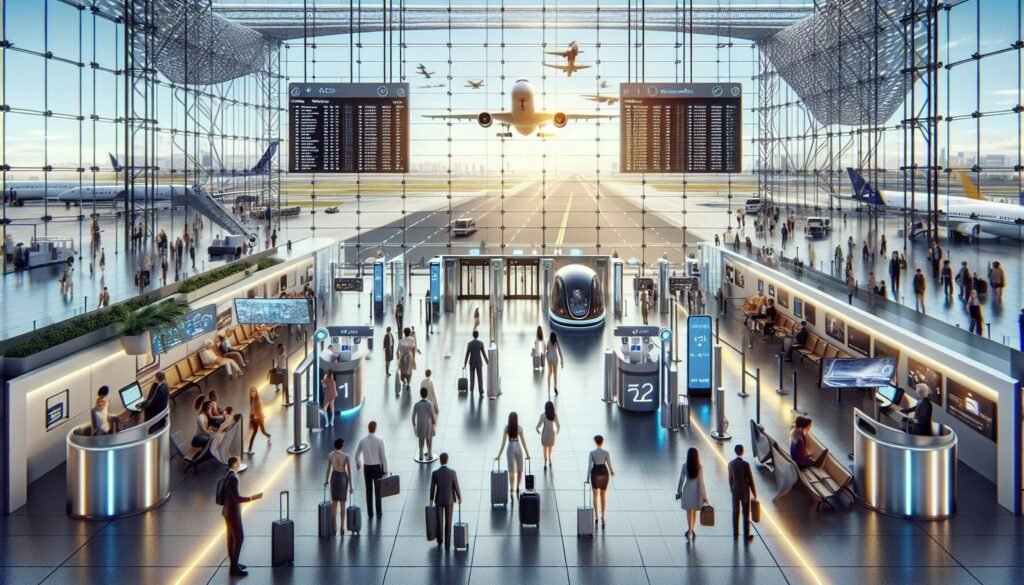In today’s world where efficiency and timeliness are paramount, airlines are increasingly adopting advanced technologies to stay competitive. A major airline near Luton Airport has integrated AI to revolutionize its flight management processes. The airline’s new control centre is powered by Jetstream, a generative AI tool designed to streamline operations and address issues for pilots and crew more efficiently.
With over 250 employees managing approximately 2,000 flights daily, the adoption of AI has been transformative for the airline. Jetstream predicts standby crew requirements and recommends optimal crewing options, ensuring seamless, punctual operations. In addition to increasing operational efficiency, the state-of-the-art facility fosters a welcoming work environment with natural light and minimal noise, demonstrating how technology can improve both performance and workplace well-being.
The role of AI in airline flight management
Predict flight delays
AI will significantly enhance flight delay prediction: Advanced algorithms will analyze extensive data sets, including weather patterns, air traffic control updates, and flight schedules, to help airlines more accurately predict delays, which will improve communication with passengers and allow for timely service adjustments.
For example, major airlines are employing AI tools that incorporate real-time data feeds to forecast potential disruptions before they affect flight schedules. Predictive analytics assess risk factors such as maintenance issues and crew availability to reduce unexpected delays. This proactive approach improves resource allocation and increases customer satisfaction.
Fuel management and cost optimization
AI is highly efficient at optimizing fuel consumption, which is essential for reducing costs and minimizing environmental impact. By analyzing flight routes, weather conditions, and aircraft performance, AI identifies the most efficient flight paths and optimal altitudes.
AI-powered tools continuously update flight plans based on real-time data to minimize fuel use, and adjustments are made during flight to accommodate changing conditions, improving efficiency. For example, algorithms can suggest the best time to change altitude to avoid turbulence, resulting in significant cost savings and reduced emissions.
In addition, AI monitors aircraft performance and maintenance needs to predict and prevent issues that lead to inefficient fuel consumption. This holistic approach ensures that each flight is operated as economically and environmentally efficient as possible.
AI-enhanced customer experience

A personalized booking and check-in process
AI tools can enhance the booking and check-in process by analyzing customer preferences and travel data to provide more customized flight options and offers. For example, frequent flyers may receive suggestions based on their usual seat preferences. AI can also streamline the check-in process using self-check-in kiosks and mobile apps, providing a user-friendly experience and reducing wait times.
Real-time updates and communication
AI enhances real-time communication with passengers. Airlines use AI to send instant updates on flight status, gate changes, and delays via SMS or mobile notifications to keep passengers well informed. In case of delays, AI systems provide quick rebooking options and compensation. AI-driven chatbots efficiently manage customer queries, reducing the need for human intervention.
By incorporating AI into these processes, airlines can significantly improve passengers’ overall travel experience.
Challenges and ethical considerations
Data Privacy Concerns
Airline AI systems rely on vast amounts of passenger data, including personal information like names, travel habits, and payment details. While AI personalizes the experience and increases efficiency, it raises significant concerns about data privacy. Airlines must implement strong security measures to protect this information from cyber attacks, as a data breach could compromise passenger privacy.
Regulations such as Europe’s GDPR require strict data handling protocols. Airlines must ensure compliance to avoid costly fines. Transparency in data usage is crucial. Passengers should understand how their data is used and have the option to opt out. Informing customers about data protection measures builds trust and alleviates privacy concerns.
Transparency in AI decision-making
AI-driven decisions will impact many aspects of airline operations, including flight schedules, pricing, customer interactions, etc. However, the complexity of AI algorithms can obscure the decision-making process, leading to distrust among passengers and regulators.
Airlines need to be transparent about their AI decisions. Providing insight into how the algorithms work and the data they use can demystify the process. Transparency ensures accountability and fosters trust. Airlines should regularly audit and review their AI systems to ensure fairness and accuracy, and address bias in AI algorithms to ensure a fair treatment for all passengers.
The outlook for AI in aviation

Technological advances
AI technology continues to transform the aviation industry. Predictive maintenance is a major advancement, improving safety and reducing operational costs by enabling AI systems to analyze real-time data from aircraft components and identify potential issues before they result in costly repairs or delays.
Improved weather forecasting models that use AI are also emerging. These models process large datasets from weather sensors and historical data to deliver accurate weather predictions. Better forecasts allow airlines to optimize flight paths, avoid severe weather, and be more fuel efficient.
AI-driven automation technologies streamline operational processes: for example, AI algorithms optimize crew schedules by taking into account factors such as crew availability, legal restrictions and operational conditions, minimizing delays and ensuring compliance with aviation regulations.
Potential for expansion and adoption
The potential for AI adoption in the aviation industry is enormous. Airlines are exploring the integration of AI into air traffic management. AI systems analyze airspace data and dynamically manage air traffic to reduce congestion, increase efficiency, and ensure safety in an increasingly congested airspace.
Airlines can also deploy AI to further personalize the customer experience: advanced machine learning models analyze passenger behavior and preferences to deliver customized services and offers, improving customer satisfaction and loyalty.
AI helps regulators ensure compliance by analyzing operational data to detect patterns that indicate non-compliance with aviation safety standards and enable proactive regulatory action to improve safety and reliability.
AI applications in baggage handling systems aim to reduce incidents due to misplaced baggage or delays. AI-enabled systems can track baggage in real time and provide updated information to passengers for a better travel experience.
Overall, the future of AI in the aviation industry looks promising: as the technology evolves, the application of AI will become even more integral to airline operations, improving efficiency, safety, and customer satisfaction.
Technology News

